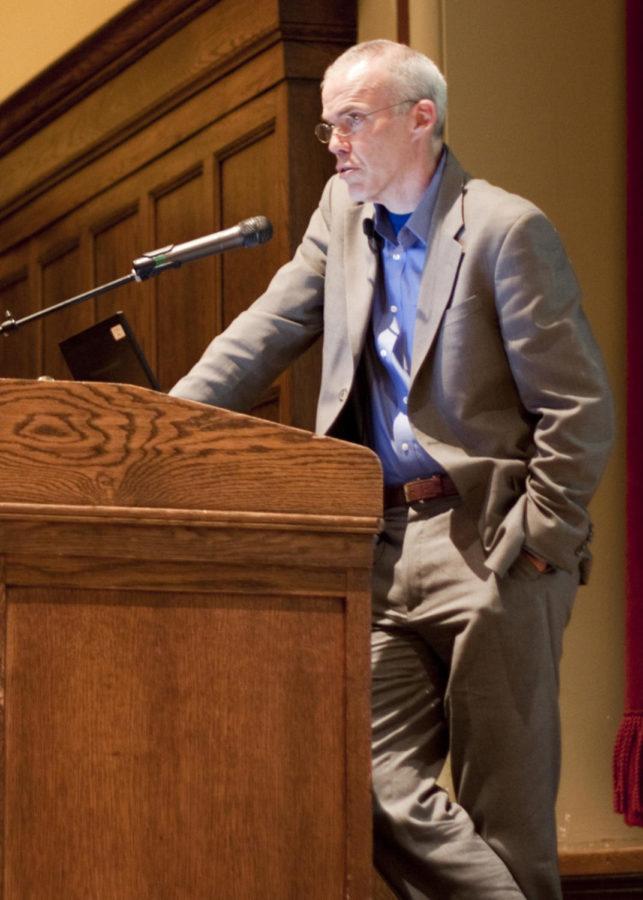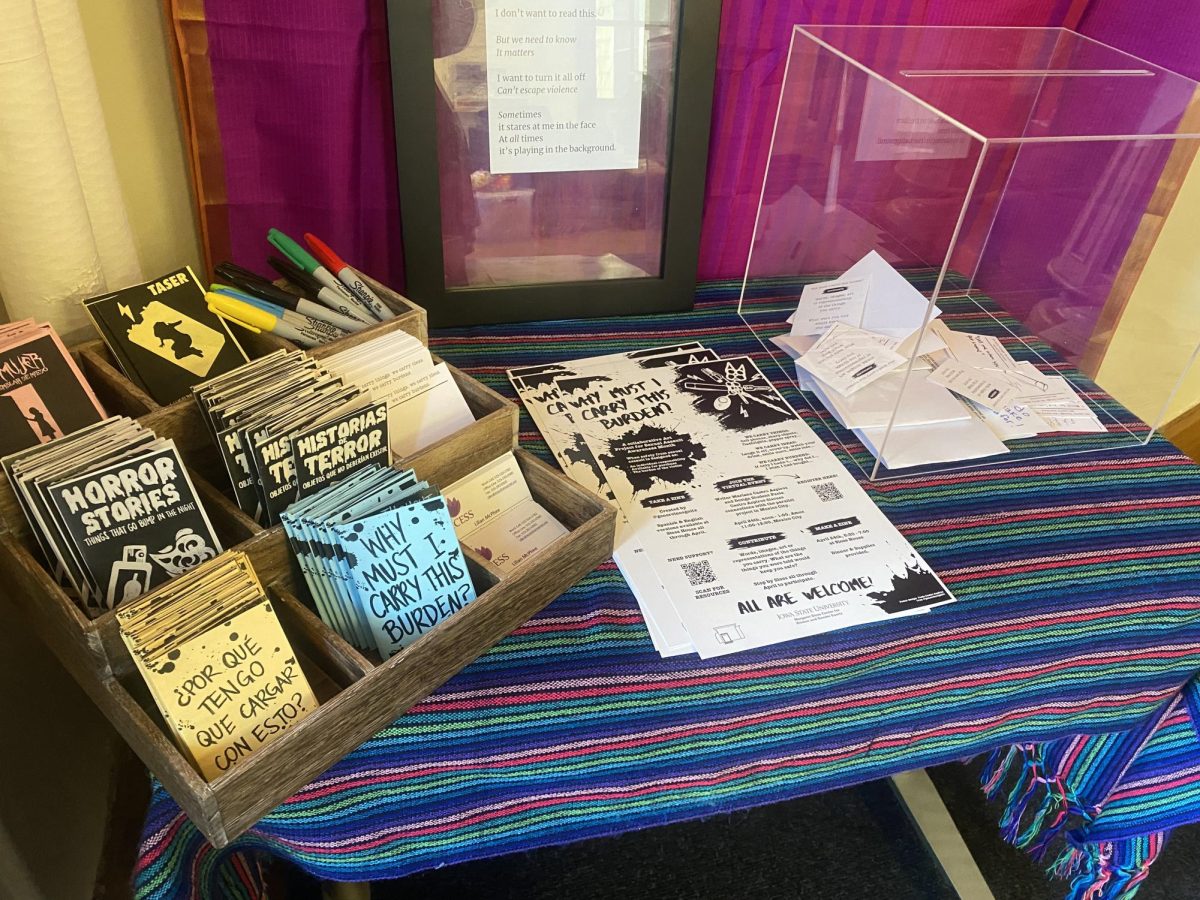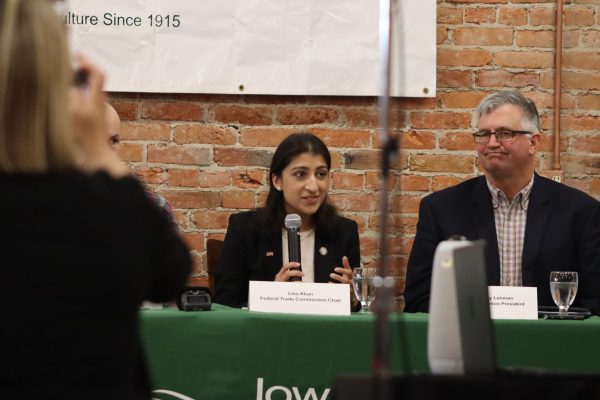Climate change addressed by world-renowned environmental author
Photo: Tsubasa Shigehara/Iowa State University
Bill McKibben, author and environmentalist, gives a lecture about climate change, alternative energy and economics on Thursday in the Great Hall of the Memorial Union. McKibben sparked the 350 movement, pushing for a reduction of CO2 emissions, which are currently at 390 parts-per-million. Photo: Tsubasa Shigehara/ Iowa State Daily
October 14, 2010
Bill McKibben, founder of 350.org and environmental author, addressed a crowd of approximately 700 people on the issues of climate change and its impact on agriculture.
Students with passions for writing similar to McKibben’s attended his lecture in order to hear about his work and experiences.
“I’m very interested in writing about the environment in a way that appeals to the general public as opposed to just an activist audience and he’s one of the best who does that,” said Megan White, graduate assistant of teaching English.
The lecture attracted those with a concern for the environment as well as a lack of action that is currently taking place to combat the issue of climate change.
“The climate issue is something that affects all of us equally and so it’s not just an issue of environment, but it’s an issue of equality,” said Brenna Dixon, graduate assistant of teaching English. “I think empowerment is an issue in this as well, because in order to accomplish something people need to feel empowered to do so, they need to feel as though they can affect change and that they have a voice and Bill McKibben’s organization 350 kind of puts that on a map in a big way.”
The timing of the lecture was perfect, McKibben said, as the summer of 2010 was the most extreme to date.
“The summer 2010 was the most brutal that the northern hemisphere has ever seen, one that gives a good foretaste of what climate change looks like in its early stages,” McKibbben said.
Illustrating this point, McKibben discussed the massive flooding and temperatures that were recorded internationally. From the 12 feet of rain in Pakistan, compared to its average 3 feet, to the eight days in August where Moscow experienced record temperatures of 100 degrees, which had never been recorded in the city’s history.
The fires set off by this phenomenon were eerie, Mckibben said. They filled Moscow with smoke to the point that the drought caused was so severe that the Kremlin decided to stop all grain exports.
“That sounds great for Iowa farmers, but if you think ahead even a little bit, you don’t have to have an immense amount of imagination to realize what happened in Russia can happen as easily across the Midwest United States,” McKibben said.
The flooding that occurred this summer implies the immediate, profound and early impact of climate change, especially on agriculture, McKibben said.
A major factor of the increased rainfall is that the atmosphere holds more water vapor than ever before. Currently, there has been four-and-a-half to five percent more moisture in the past four years, which leads to increased precipitation. This has caused the flows of rivers and streams around the world to increase by 10 percent.
“Here’s the thing to bear in mind,” McKibben said. “All that’s happened so far has happened with an increase in temperature of about one degree. The climatologists are pretty clear that we’ve already bought ourselves another degree from carbon we’ve already emitted, coal and oil and gas.”
A major focus of McKibben’s work with climate change deals with combatting the amount of fossil fuels that humans are burning.
“Unless we get our act together very quickly, getting our act together meaning, getting off fossil fuel in rapid order, much more quickly than is politically or economically convenient, unless we do that the temperature will rise 4 or 5 or 6 degrees before the century is out,” McKibben said.
The biggest challenge that the fight against climate change faces is the lack of political effort dealing with the issue.
“The question is, will we muster the poltical will, not the engineering know-how, but the political will to put that engineering know-how to work fast enough to matter,” McKibben said. “We have to move now and we have to do it in the face of determined opposition from people who don’t want to change and most of those people are in the fossil fuel industry, because the fossil fuel industry is the most profitable industry that human beings have ever engaged in.”
McKibben ended his lecture with a slideshow of various 350 events that took place Sunday across the world. The events showcased the fact that people across the world are taking action against climate change, with the planting of trees and gardens, the repairing of bicycles and the laying of bike paths. Such events brought McKibben to ask, if the community can do things to benefit the environment, why can’t legislation?
“I’ve heard of other environmental stuff, but it was good to hear about what we’re doing for it, and the types of protests and movements and things [that are taking place],” said Corrie Byrne, graduate assistant of teaching English.

















